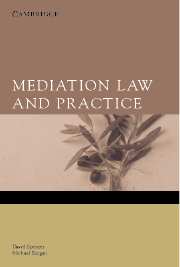Book contents
- Frontmatter
- Contents
- Acknowledgements
- Preface
- List of tables and figures
- Table of statutes
- Table of cases
- PART I THE PRACTICE OF MEDIATION
- 1 Mediation: Its Definition and History
- 2 The Mediation Process
- 3 The Theory and Philosophy of Mediation
- 4 Specific Types of Mediation
- 5 The Mediator
- 6 The Ethics of Mediation
- 7 Power, Empowerment and Difference in Mediation
- PART II THE LAW OF MEDIATION
- Bibliography
- Index
3 - The Theory and Philosophy of Mediation
Published online by Cambridge University Press: 05 June 2012
- Frontmatter
- Contents
- Acknowledgements
- Preface
- List of tables and figures
- Table of statutes
- Table of cases
- PART I THE PRACTICE OF MEDIATION
- 1 Mediation: Its Definition and History
- 2 The Mediation Process
- 3 The Theory and Philosophy of Mediation
- 4 Specific Types of Mediation
- 5 The Mediator
- 6 The Ethics of Mediation
- 7 Power, Empowerment and Difference in Mediation
- PART II THE LAW OF MEDIATION
- Bibliography
- Index
Summary
Introduction
In this chapter we take a more theoretical view of mediation. We begin with a philosophical consideration of the key features of mediation practice. We then examine the five philosophies of mediation – confidentiality, voluntariness, empowerment, neutrality, and a unique solution – with a critical view as to what the terms mean and how central to mediation practice they are. Following that we look at the various models of mediation, and focus our attention upon the facilitative, evaluative and transformational models. We conclude the chapter with an examination of when mediation is effective and appropriate and what some of its weaknesses are.
The form and function of mediation
It is one thing to state that a mediation is comprised of certain basic practical components (see Chapter 2). It is another to refer to mediation in a generic way, given the variety of mediation situations and the flexibility of the process (see uses in Chapter 2). But what of attempting to distill, from the processes and variety of mediation, some theoretically-oriented perspective? In an article entitled ‘Mediation – Its Forms and Functions’, Professor Lon Fuller, noted Harvard Law Professor and self-titled ‘student of jurisprudence’, provided an analysis of mediation, ‘attempting to go beyond the generalities’ of mere description by comparing and contrasting mediation with the key components of a collective bargaining dispute (Fuller 1970–1, pp 305–39). In so doing, Fuller commented on the proper function of the mediator, and the role of mediation within broader society.
- Type
- Chapter
- Information
- Mediation Law and Practice , pp. 83 - 124Publisher: Cambridge University PressPrint publication year: 2007



